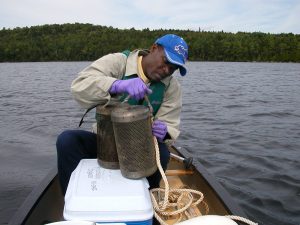Maine Reaps Benefits of 50-Year-Old Water Resources Research Act
 The Maine Water Resources Research Institute (WRRI), a program of the Senator George J. Mitchell Center for Sustainability Solutions, joins the U.S. Geological Survey (USGS), stakeholders and academic partners in recognizing the importance of the pivotal Water Resources Research Act (WRRA) on it’s 50th anniversary.
The Maine Water Resources Research Institute (WRRI), a program of the Senator George J. Mitchell Center for Sustainability Solutions, joins the U.S. Geological Survey (USGS), stakeholders and academic partners in recognizing the importance of the pivotal Water Resources Research Act (WRRA) on it’s 50th anniversary.
Signed into law by in 1964 President Lyndon B. Johnson, the WRRA established a research institute or WRRI in each state and Puerto Rico. In his official statement, President Johnson said the WRRA “will enlist the intellectual power of universities and research institutes in a nationwide effort to conserve and utilize our water resources for the common benefit. The new centers will be concerned with municipal and regional, as well as with national water problems. Their ready accessibility to state and local officials will permit each problem to be attacked on an individual basis, the only way in which the complex characteristics of each water deficiency can be resolved… The Congress has found that we have entered a period in which acute water shortages are hampering our industries, our agriculture, our recreation, and our individual health and happiness.”
Maine’s WRRI “provides leadership and support to help solve Maine’s water problems by supporting researchers and educating tomorrow’s water scientists. Our goal is to generate new knowledge that can help us maintain important water resources,” said John Peckenham, Director of the institute and Associate Director and Senior Research Scientist at the Mitchell Center.
The Maine WRRI has supported the study of such problems as harmful algae blooms in Maine’s rivers and lakes, arsenic in drinking water, stormwater management, lake acidification and water pollution control techniques. The institute also sponsors the annual Maine Water Conference that brings together people from across Maine who are connected with water resources to share experiences and make new alliances.
Mitchell Center scientists say WRRI grants have facilitated valuable research over the years.
“The grants help faculty and students conduct meaningful research that aids in the management of streams, rivers, and lakes in Maine,” said Sean Smith, Assistant Professor in the School of Earth and Climate Sciences. “It is difficult or impossible to manage and rehabilitate Maine’s freshwater resources effectively without knowledge of how the freshwater systems work and an understanding of how humans affect them. The WRRI grants provide a mechanism for advancing this knowledge and understanding in Maine.”
In 2014, the Maine WRRI is supporting research at Sebago Lake, the drinking water supply for the greater Portland metropolitan area. Led by Smith, the project seeks to quantify connections between geography, land cover, climate and hydraulic conditions within tributaries draining to the lake. The connections between these factors are at the heart of major pollution concerns throughout the Northeast. The research seeks to help guide land use planning, pollution management, aquatic habitat conservation, and public water supply protection.
Another WRRI project in Lake Auburn, a source of drinking water for the Lewiston/Auburn area, is focused on increased levels of phosphorus in the lake. This could compromise public health and eventually result in a water treatment filtration requirement that could result in a greater cost to the community. The work supplements the existing knowledge of the lake and its results will enhance lake and water supply management strategies. The research team is led by: Aria Amirbahman, Professor of Civil and Environmental Engineering; Stephen Norton, Distinguished Maine Professor, Professor Emeritus, Climate Change Institute and School of Earth and Climate Sciences; Linda Bacon, Lakes Program,  Maine Department of Environmental Protection (DEP).
Maine Department of Environmental Protection (DEP).
Other Resources:
